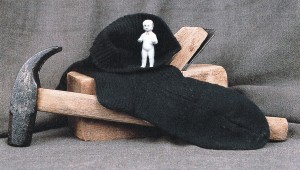The porcelain doll with outstretched arms is a Frozen Charlotte doll, found in a carpenter’s toolbox on the Steamboat Arabia. Frozen Charlotte dolls were were popular in the 19th century as children’s toys and also as moralizing tools. The tale of “Fair Charlotte” was first recorded by humorist Seba Smith in an 1844 periodical. This poem later evolved into a folk song and series of dolls, all with the intent of reminding children to listen to their mothers. You may notice that the doll is nude and is a baby doll, even though the protagonist of the poem is a teenager in a lovely dress. This is typical for 19th-century dolls; girls were encouraged to make clothes for them to practice their sewing skills.
Excerpt from “A Corpse Going to a Ball” by Seba Smith
- From The Rover: Weekly Magazine of Tales, Poetry, and Engravings; Volume Two. Edited by Seba Smith. New York: 1844. Published by S.B. Dean & Co., 162 Nassau Street.
…At the village inn, fifteen miles off,
Is a merry ball to-night—
The piercing air is cold as death,
But her heart is warm and light;
And brightly beams her laughing eye,
As a well-known voice she hears;
And dashing up to the cottage door
Her Charley’s sleigh appears.
“Now daughter dear,” her mother cried,
“This blanket round you fold,
“For ’tis a dreadful night abroad,
“You’ll catch your death a-cold.”
“O nay, O nay,” fair Charlotte said,
And she laugh’d like a gipsy queen,
“To ride with blankets muffled up
“I never could be seen—
“My silken cloak is quite enough;
“You know ’tis lined throughout;
“And then I have a silken shawl
“To tie my neck about.”
…
Five cold, long miles they’ve pass’d,
And Charles, with these few frozen words,
The silence broke at last—
“Such night as this I never saw—
“The reins I scarce can hold;”
And Charlotte, shivering, faintly said,
“I am exceeding cold.”
He crack’d his whip, and urged his steed
More swifily than before,
And now five other dreary miles;
In silence are pass’d o’er—
“How fast,” said Charles the freezing ice
“Is gathering on my brow;”
But Charlotte said, with feebler tone.
“I’m growing warmer now.”
And on they went through the frosty air
And the glittering, cold star-light;
And now at last the village inn
And the ball-room are in sight.
They reach the door, and Charles jumps out,
And holds his hand to her— Why sits she like a monument,
That hath no power to stir?
He call’d her once—he call’d her twice—
She answer’d not a word;
He ask’d her for her hand again,
But still she never stirr’d—
He took her hand in his—O God!
‘Twas cold and hard as stone;
He tore the mantle from her face;
The cold stars on her shone—
Then quickly to the lighted hall
Her voiceless form he bore—
His Charlotte was a stiflen’d corpse,
And word spake never more!
